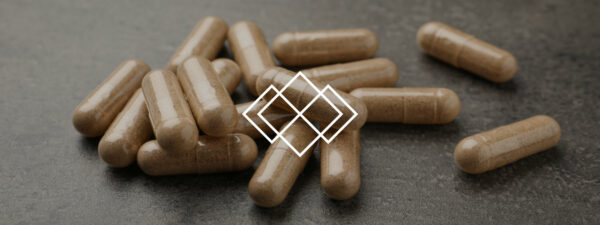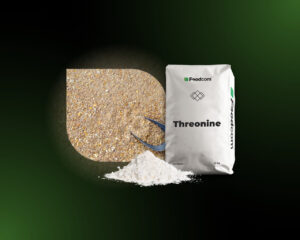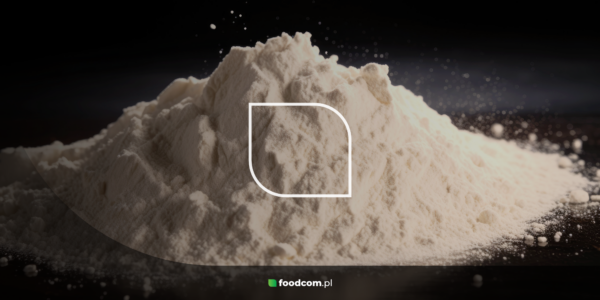- Threonine is an amino acid that can’t be synthesised by the body on its own.
- Participates in the production of Collagen and influences the efficient functioning of the digestive system.
- Threonine is used in the animal feed and pharmaceutical industries.
What is Threonine?
Threonine is an organic chemical compound, an amino acid that belongs to the 20 basic protein amino acids. It is an essential amino acid, that is, one that the human body cannot synthesize itself, so it must be supplied through diet or supplements. Chemically, it is an optically active amino acid with an additional carbon atom.
Threonine can occur naturally in food. It is found in meat products, dairy products, cereals and legumes. Products rich in threonine include cottage cheese, milk, butter, eggs, gelatin, and sesame seeds. Threonine is also obtained by fermentation in a microbiological process.
Threonine contains an α-amino group, a carboxyl group, and a side chain containing a hydroxyl group. The name of this amino acid is derived from threonic acid, a monosaccharide with four carbon atoms and a molecular formula, because they have a similar structure. Would you like to learn more about Threonine? Then be sure to read on!
Threonine – functions
Threonine has many functions that are important for the proper functioning of the entire body. This amino acid is involved in the production of collagen and elastin and gives the skin firmness, elasticity, moisture, eliminates fine wrinkles, i.e. it delays the aging process. It also makes the epidermis more resistant to mechanical damage, and wounds heal faster.
Threonine also has an effect on the digestive system. It regulates digestion, replenishes the mucous membranes of the small intestine and stomach, and supports fat metabolism in the liver. Thanks to Threonine, immunity is also strengthened, as it is involved in the production of antibodies and the body is more resistant to infections. This amino acid also affects the dentition, as it has a strengthening effect on tooth enamel. It also ensures the proper functioning of the thyroid gland.
In addition, this amino acid has a positive effect on the assimilation of nutrients and the work of the nervous system. Thanks to Threonine, concentration increases and memory improves. It also reduces the feeling of fatigue.
A lack of Threonine has a negative effect on the functioning of the entire body, as it leads to excessive emotional agitation, nervous disorders, depression and permanently increased mental tension. It also inhibits protein metabolism, causing difficulty absorbing nutrients from food and fatty liver. You may also notice severely dry skin. In contrast, an excess of Threonine has no adverse effects on the human body.
Threonine – applications
Because of its numerous functions in the human body, Threonine is used primarily in the pharmaceutical industry and especially in the manufacture of dietary supplements. It is also a component of protein supplements, especially for athletes, as regular and intense physical activity increases the need for Threonine.
In addition, Threonine is also used in the feed industry, as it is an important component of animal nutrition, especially in poultry, pigs and aquaculture. It is added to the feed premixes.
Threonine is also an ingredient in cosmetics. Since it improves the condition of skin and hair, it is added to creams, firming lotions, shampoos or hair conditioners. Skin cosmetics with Threonine have a moisturizing and toning effect, while hair cosmetics with this amino acid ensure that the hair becomes less electrified, easier to comb and less brittle.
Threonine in animal nutrition
Threonine has many properties that make it a very important addition to animal feed. It is an essential amino acid and is involved in many metabolic processes. It ensures proper development and weight gain in animals, thus increasing the efficiency of meat production. In addition, Threonine has a positive effect on the immune system, regulates the function of the digestive tract, improves intestinal health and is involved in fat metabolism.
Threonine in feed also has a significant effect on the environment, as it reduces nitrogen excretion into the environment. For this reason, threonine is often chosen by breeders – it not only reduces feed costs, but also increases animal performance.
Why Foodcom?
Our great team of Sales Support will help our Traders conduct the contract and business deals in a smooth and efficient way to ensure the best quality service to all our Business Partners. Our logistics team will take care of transportation and the financial department will be responsible for all matters connected with the financial part of the deal. Do not hesitate! Contact us.










